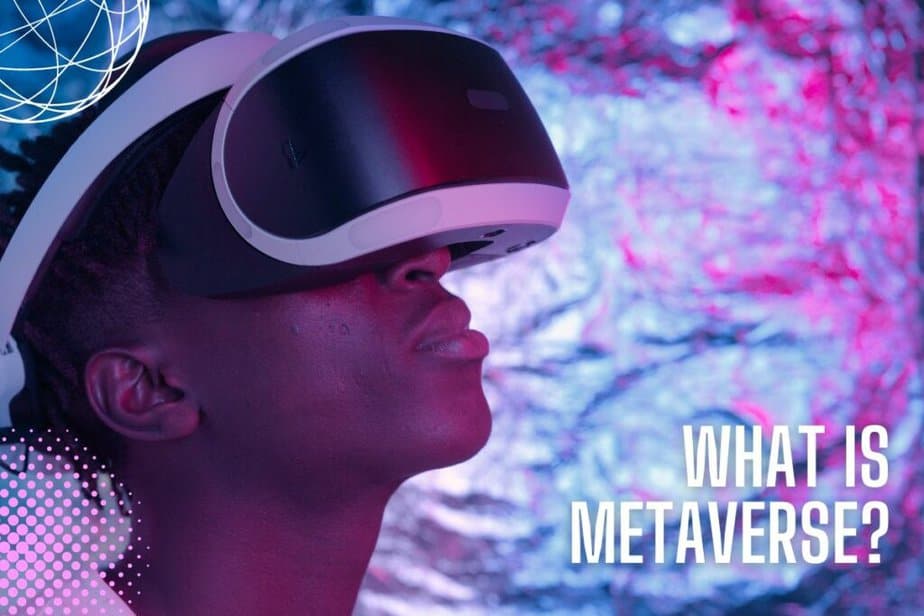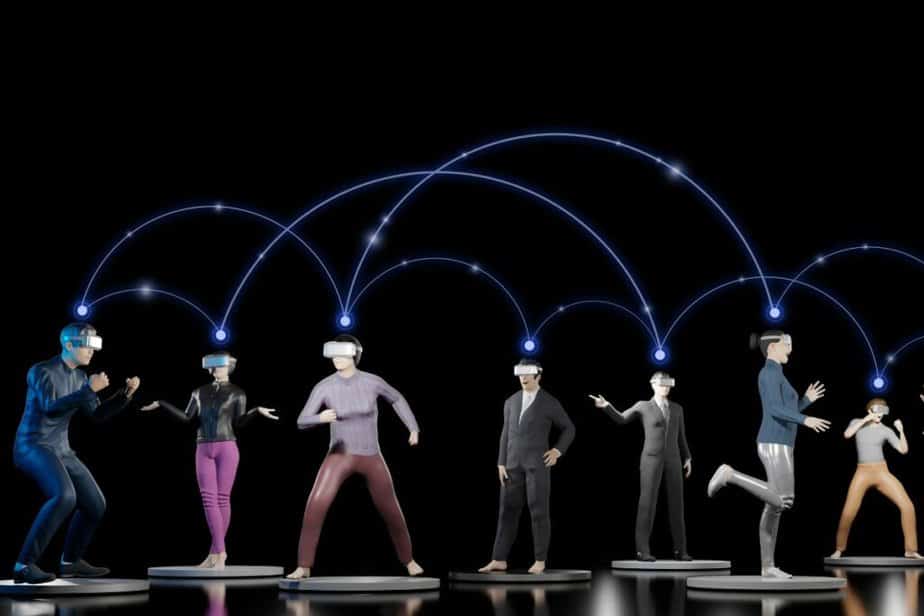What Is Metaverse and Why Is Everyone Talking About It?
We’re reader-supported; we may earn a commission from links in this article.
The term Metaverse has been circulating around the tech and gaming world recently, but what exactly is it?
In this article, we will explore the concept of the Metaverse, its importance, how it works, challenges and concerns, and the future of the Metaverse.
Read on to find out more!
1. What is Metaverse?

Metaverse is a virtual space that allows users to interact with each other and the digital world.
It is a fully immersive experience that is different from traditional virtual reality because it offers a persistent digital world that can be accessed at any time.
Metaverse is not just a video game itself, but it is an entire digital universe that can be used for various purposes.
Virtual reality is a simulated experience that can be similar to real life or completely different from the real world.
However, Metaverse is a virtual world that is a direct extension of the internet. It is an interconnected network of virtual spaces that allow users to interact with each other and the digital world.
Some examples of existing Metaverse include Second Life, Fortnite, Minecraft, and Roblox. These are all virtual worlds where users can interact with each other virtual objects and the environment.
2. Why is Metaverse important?

Metaverse is important because it is the future of the internet. As the world becomes more digital, people are looking for more immersive and interactive experiences. Metaverse offers a fully immersive experience that is not possible with traditional internet.
Metaverse has the potential to be used in various industries such as education, entertainment, healthcare, and business. It can be used for virtual training, virtual events, and virtual showrooms. It can also be used for social interactions and gaming.
Metaverse has many advantages over traditional internet, such as the ability to interact with each other in real-time rendered in-time, create and customize avatars, and explore virtual spaces.
3. The History of Metaverse
The history of the metaverse can be traced back to the early days of the internet.
In the late 1980s and early 1990s, virtual reality was a new and emerging technology. The concept of a virtual world was being explored by researchers and developers alike.
In the mid-1990s, the first metaverse platform was created. It was called Active Worlds, allowing users to create their virtual worlds and interact with each other.
However, it was not very successful, and it eventually shut down.
In the years that followed, various other metaverse platforms were created, but none of them gained significant traction. It was not until the introduction of Second Life in 2003 that metaverse gained mainstream attention.
4. How does Metaverse work?
Metaverse works by using various components such as virtual spaces, digital avatars, and blockchain technology. Virtual spaces are digital environments that users can explore and interact with. Avatars are the digital representations of users in the virtual world.
Blockchain technology is used for secure and transparent transactions in the virtual world.
Metaverse is developed using various technologies such as virtual, augmented, and artificial intelligence. These technologies are used to create a fully immersive experience for users.
5. The Potential of Metaverse

The potential of the metaverse is vast and exciting. It can potentially revolutionize how we live, work, and interact with each other.
Here are some of the potential uses of metaverse:
a. Socializing
Metaverse has the potential to create a new kind of social interaction that is not limited by physical boundaries. People from all over the world can come together in a virtual space and interact with each other.
b. Business
Metaverse can create new business opportunities, such as virtual real estate, virtual events, and virtual product launches.
c. Education
Metaverse can provide a new way of learning that is more interactive and engaging than traditional methods.
d. Entertainment
Metaverse can create new forms of entertainment, such as virtual concerts and virtual reality games.
6. The Current State of Metaverse
Currently, the metaverse is still in its early stages of development. Several platforms allow users to create their own virtual worlds and interact with each other, such as Second Life, VRChat, and Decentraland.
However, these platforms are still relatively small compared to the potential of the metaverse.
The technology involved with creating a reliable metaverse is still evolving, and there are many challenges that need to be addressed, such as scalability, security, and interoperability.
Despite these challenges, consumers and businesses have a growing interest in the metaverse.
Many technology companies are now investing in metaverse technology, and a growing community of developers and enthusiasts are working on creating new metaverse platforms and experiences.
7. Challenges and Concerns with the Metaverse
Metaverse faces several challenges and concerns, including security and privacy issues, economic and social implications, and the need for regulations and standards.
Security and privacy issues are significant concerns in Metaverse. As with any digital platform, there is a risk of cyberattacks, hacking, and identity theft.
Additionally, there is also a concern about the use of personal data in Metaverse and how it is collected, stored, and used.
Economic and social implications are another concern. As the Metaverse economy becomes more mainstream, it will significantly impact the economy and society.
There may be a shift in the way we work and interact with each other, which could have both positive and negative consequences.
The need for regulations and standards is also important for Metaverse. There are currently no universal rules or standards for Metaverse, which could lead to potential problems.
It is important to have regulations in place to ensure the safety and security of users and to prevent abuse of or access to the Metaverse platform.
8. What is the Future of Metaverse?
The future of Metaverse is promising. It has the potential to be used in various industries and to provide a fully immersive and interactive experience for users.
The possibilities of Metaverse are endless, from a virtual environment for training and education to virtual events and gaming.
As technology advances, Metaverse is expected to become more sophisticated and accessible. It is predicted that Metaverse will become a significant part of our digital lives in the future, and it will significantly impact society and culture.
Metaverse has the potential to revolutionize the way we interact with each other online. It can provide a more immersive and engaging experience than traditional social media platforms like Facebook and Twitter.
In the metaverse, users can interact with each other in real-time and create their own content. They can also create their own virtual worlds and invite others to explore them.
Metaverse can provide a new way of socializing, not limited by physical boundaries. People worldwide can come together in a shared virtual space and interact with each other.
9. Metaverse and Business Opportunities
Metaverse can create new business models and opportunities, such as virtual real estate, virtual events, and virtual product launches.
In the metaverse, businesses can create virtual storefronts and sell products directly to consumers for virtual currency. They can also host virtual events, such as conferences and trade shows.
Metaverse can provide a new way of marketing products and services that are more immersive and engaging than traditional methods.
10. The Ethical Concerns with Metaverse
Metaverse raises several ethical concerns that need to be addressed. Some of these concerns include:
a. Privacy
Metaverse platforms collect a lot of data on their users, and there is a risk that this data could be used for malicious purposes.
b. Addiction
There is a risk that some users could become addicted to the metaverse and spend too much time in it.
c. Discrimination
There is a risk that some users could be discriminated against in the metaverse based on factors such as race, gender, or economic status.
d. Exploitation
There is a risk that some users could be exploited in the metaverse, such as through scams or cyber-attacks.
11. Metaverse and Gaming
Metaverse and gaming are closely related. Many early metaverse platforms, such as Second Life, were created for gaming purposes.
In the metaverse, gaming can be taken to a whole new level. Users can create their own virtual games and share them with others.
They can also participate in massively multiplayer games with thousands of other players from all over the world.
12. Metaverse and Education
Metaverse has the potential to revolutionize the way we learn. It can provide a more interactive and engaging experience than traditional methods.
In the metaverse, students can explore immersive virtual worlds and environments and interact with educational content in real-time.
They can also collaborate with other students and teachers from all over the world.
Metaverse can provide a new way of learning that is more immersive and engaging than traditional methods.
The metaverse can also provide access to educational content for people who live in remote or underprivileged areas.
13. How to Get Involved with Metaverse
If you are interested in getting involved with metaverse development, there are several ways to do so. You can join online communities and forums where developers and enthusiasts discuss metaverse technology and share ideas.
You can also try out some of the existing metaverse platforms, such as Second Life or VRChat, and start creating your own content.
You can also attend metaverse conferences and events to learn more about the technology and meet other people who are interested in it.
Personally, I recommend checking out Decentraland, Second Life, Roblox, and Sandbox yourself to see what the experience is all about!
15. The Advantages and Disadvantages of Metaverse
Metaverse has both advantages and disadvantages. Some of the advantages include:
- Immersive and engaging experience
- New social interactions
- New business opportunities
- New educational opportunities
Some of the disadvantages include:
- Privacy concerns
- Addiction
- Discrimination
- Exploitation
Conclusion
In conclusion, Metaverse is a virtual space that is accessible by anyone, anywhere, at any time. It offers a fully immersive experience that is different from traditional virtual reality.
Metaverse is the future of spatial computing on the internet, and it has the potential to be used in various industries and to provide a fully immersive and interactive experience for users.
However, Metaverse’s challenges and concerns need to be addressed, such as security and privacy issues, economic and social implications, and the need for regulations and standards.
The future of Metaverse is promising, and it is expected to become a significant part of our digital lives in the future.
Therefore, it is important to continue to monitor the development of Metaverse technologies and to address the challenges and concerns to ensure a safe and secure virtual world.
FAQs
Is Metaverse only for gaming?
No, Metaverse is not only for gaming. It can be used for various purposes, such as education, entertainment, healthcare, and business.
How is Metaverse different from virtual reality?
Metaverse is different from virtual reality because it offers a persistent digital world that can be accessed at any time. Virtual reality is a simulated experience that can be similar or completely different from the real physical world.
Will Metaverse replace the internet?
Metaverse is not expected to replace the internet, but it will be a significant part of it. Metaverse offers a fully immersive and interactive experience that is not possible with the traditional internet.
What are some existing Metaverse platforms?
Some examples of existing Metaverse platforms include Second Life, Fortnite, Minecraft, and Roblox.
Is Metaverse safe?
Metaverse faces security and privacy issues, but steps are being taken to address them. It is important to be cautious and aware when using Metaverse and to follow best practices for online safety and security.

Justin Chia
Justin is the author of Justjooz and is a data analyst and AI expert. He is also a Nanyang Technological University (NTU) alumni, majoring in Biological Sciences.
He regularly posts AI and analytics content on LinkedIn, and writes a weekly newsletter, The Juicer, on AI, analytics, tech, and personal development.
To unwind, Justin enjoys gaming and reading.

